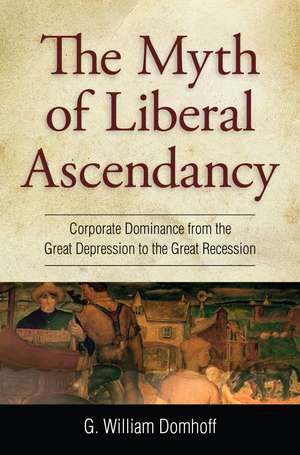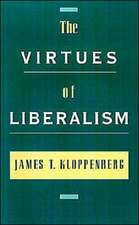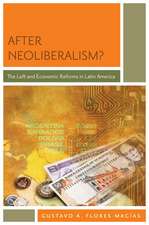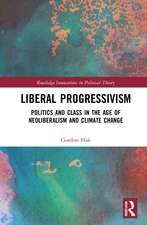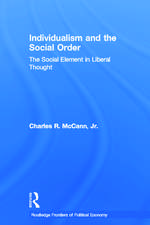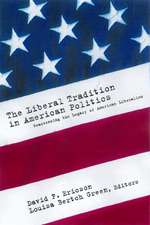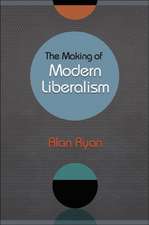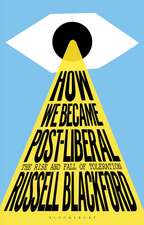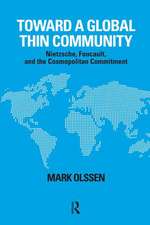Myth of Liberal Ascendancy: Corporate Dominance from the Great Depression to the Great Recession
Autor G. Williams Domhoffen Limba Engleză Paperback – 30 noi 2013
| Toate formatele și edițiile | Preț | Express |
|---|---|---|
| Paperback (1) | 349.80 lei 43-57 zile | |
| Taylor & Francis – 30 noi 2013 | 349.80 lei 43-57 zile | |
| Hardback (1) | 1222.85 lei 43-57 zile | |
| Taylor & Francis – 30 noi 2013 | 1222.85 lei 43-57 zile |
Preț: 349.80 lei
Nou
Puncte Express: 525
Preț estimativ în valută:
66.96€ • 72.75$ • 56.28£
66.96€ • 72.75$ • 56.28£
Carte tipărită la comandă
Livrare economică 21 aprilie-05 mai
Preluare comenzi: 021 569.72.76
Specificații
ISBN-13: 9781612052564
ISBN-10: 1612052568
Pagini: 320
Ilustrații: black & white illustrations
Dimensiuni: 156 x 234 x 16 mm
Greutate: 0.45 kg
Ediția:1
Editura: Taylor & Francis
Colecția Routledge
Locul publicării:Oxford, United Kingdom
ISBN-10: 1612052568
Pagini: 320
Ilustrații: black & white illustrations
Dimensiuni: 156 x 234 x 16 mm
Greutate: 0.45 kg
Ediția:1
Editura: Taylor & Francis
Colecția Routledge
Locul publicării:Oxford, United Kingdom
Cuprins
Preface; Introduction; Chapter One Demonstrating Corporate Dominance; Chapter Two The Rise and Sudden Decline of the Liberal-Labor Alliance, 1934–1938; Chapter Three Leadership for Corporate Moderates, 1939–1945; Chapter Four The Postwar Years and the Truman Administration; Chapter Five Corporate Moderate Frustrations; Chapter Six Corporate Moderate Successes in the Kennedy Years; Chapter Seven Corporate Moderation and More Success; Chapter Eight New Sources of Conflict between Corporations and Unions; Chapter Nine Corporate Policy Success and Economic Failure in the First Nixon Administration; Chapter Ten The Rise of the Business Roundtable and Tension within the CED, 1973–1976; Chapter Eleven Corporate Triumphs during the Carter Administration; Chapter Twelve The Reagan Culmination, 1981–1984; Chapter Thirteen The Road to the Great Recession;
Notă biografică
G. William Domhoff is a Distinguished Professor Emeritus and a Research Professor at the University of California, Santa Cruz, where he has taught since 1965. He is the author or coauthor of fifteen books on power, politics, and social change in America, starting with Who Rules America? (1967) and The Higher Circles (1970), along with The Powers That Be (1979) and The Power Elite and the State (1990). His most recent books are The Leftmost City: Power and Progressive Politics in Santa Cruz (with Richard Gendron, 2009); Class and Power in the New Deal: Corporate Moderates, Southern Democrats, and the Liberal-Labor Coalition (with Michael J. Webber, 2011); The New CEOs: Women, African American, Latino, and Asian American Leaders of Fortune 500 Companies (with Richard L. Zweigenhaft, 2011); and Who Rules America? The Triumph of the Corporate Rich (seventh edition, 2013).
Recenzii
"The sociologist G. William Domhoff has long been a leading analyst and critic of corporate power and economic inequality in the United States. The Myth of Liberal Ascendancy builds on his previous work and offers his broadest historical narrative of what he sees as continual corporate dominance over American public policy since the late 1930s...[it]represents one of the most comprehensive and persuasive historical overviews available..."
—The Journal of American History
“Domhoff makes a convincing case that business leaders were more influential in the development of public policy during these decades than most other accounts would have it. VERDICT Whether or not they agree with him, historians and political scientists will need to reckon with the reach of Domhoff’s argument, the depth of his research, and the controlled passion underlying both.” –Library Journal
"Domhoff reminds us in his latest masterpiece, The Myth of Liberal Ascendency, the class war perpetrated by corporations and their owners against the rest of America predates the Reagan Era and, in fact runs all the way back to the New Deal and earlier." –Jewish Currents
"No one who wants to claim understanding of the nature of American economic policy can ignore this work. Domhoff has meticulously scrutinized dozens of episodes over the last half century in the endless political battle to achieve a semblance of economic fairness and social justice. As the story unfolds, we see the ways that corporate power has profoundly restricted the capacity of government to promote equality of opportunity and economic security—even when some headway was being made. Those who think they know that story will find in this work a great deal of news and much to challenge their presuppositions.”
—Richard Flacks, University of California, Santa Barbara
"Domhoff's exhaustive review of national policy-making from 1939 to the Great Recession inflicts major damage on studies that find periods of liberal ascendancy alternating with periods of conservative dominance. Students will find abundant evidence in his research."
—John F. Manley, Professor Emeritus of Political Science, Stanford University
"This is a beautifully written inquiry into how the United States moved so far to the political right in recent decades. Professor Domhoff provides a careful analysis of one of the most dramatic and important transitions of our times: the transformation from relative equality during most of the years immediately before and after World War II, to a world in which a well-organized and politically-engaged corporate community accelerated a movement to the right, starting in the 1970's. In addition to making an important contribution to understanding historic political shifts, this book also contributes to our understanding of patterns of inequality and the concentration of social and financial resources in the hands of a small portion of the population. The book is a must-read for sociologists, economists, political scientists, historians, and anyone who cares about inequality.
—Lisa A. Keister, Duke University
"In his most recent book, Domhoff debunks the view that the United States moved toward greater equality during the New Deal and that it wasn't until decades later that the power elite began its rise to power. Instead he convincingly demonstrates, contrary to the "fairy tale" of a liberal-labor ascendancy, that the large corporations have been well-organized and politically mobilized since the late 1930s and that the U.S. has experienced increasing corporate dominance ever since."
—Jill Quadagno, author of One Nation, Uninsured : Why the U.S. Has No National Health Insurance, Oxford University Press (2006)
—The Journal of American History
“Domhoff makes a convincing case that business leaders were more influential in the development of public policy during these decades than most other accounts would have it. VERDICT Whether or not they agree with him, historians and political scientists will need to reckon with the reach of Domhoff’s argument, the depth of his research, and the controlled passion underlying both.” –Library Journal
"Domhoff reminds us in his latest masterpiece, The Myth of Liberal Ascendency, the class war perpetrated by corporations and their owners against the rest of America predates the Reagan Era and, in fact runs all the way back to the New Deal and earlier." –Jewish Currents
"No one who wants to claim understanding of the nature of American economic policy can ignore this work. Domhoff has meticulously scrutinized dozens of episodes over the last half century in the endless political battle to achieve a semblance of economic fairness and social justice. As the story unfolds, we see the ways that corporate power has profoundly restricted the capacity of government to promote equality of opportunity and economic security—even when some headway was being made. Those who think they know that story will find in this work a great deal of news and much to challenge their presuppositions.”
—Richard Flacks, University of California, Santa Barbara
"Domhoff's exhaustive review of national policy-making from 1939 to the Great Recession inflicts major damage on studies that find periods of liberal ascendancy alternating with periods of conservative dominance. Students will find abundant evidence in his research."
—John F. Manley, Professor Emeritus of Political Science, Stanford University
"This is a beautifully written inquiry into how the United States moved so far to the political right in recent decades. Professor Domhoff provides a careful analysis of one of the most dramatic and important transitions of our times: the transformation from relative equality during most of the years immediately before and after World War II, to a world in which a well-organized and politically-engaged corporate community accelerated a movement to the right, starting in the 1970's. In addition to making an important contribution to understanding historic political shifts, this book also contributes to our understanding of patterns of inequality and the concentration of social and financial resources in the hands of a small portion of the population. The book is a must-read for sociologists, economists, political scientists, historians, and anyone who cares about inequality.
—Lisa A. Keister, Duke University
"In his most recent book, Domhoff debunks the view that the United States moved toward greater equality during the New Deal and that it wasn't until decades later that the power elite began its rise to power. Instead he convincingly demonstrates, contrary to the "fairy tale" of a liberal-labor ascendancy, that the large corporations have been well-organized and politically mobilized since the late 1930s and that the U.S. has experienced increasing corporate dominance ever since."
—Jill Quadagno, author of One Nation, Uninsured : Why the U.S. Has No National Health Insurance, Oxford University Press (2006)
Descriere
Based on new archival research, argues that the 'New Deal' era in the US was one of corporate dominance rather than progressive reform.
